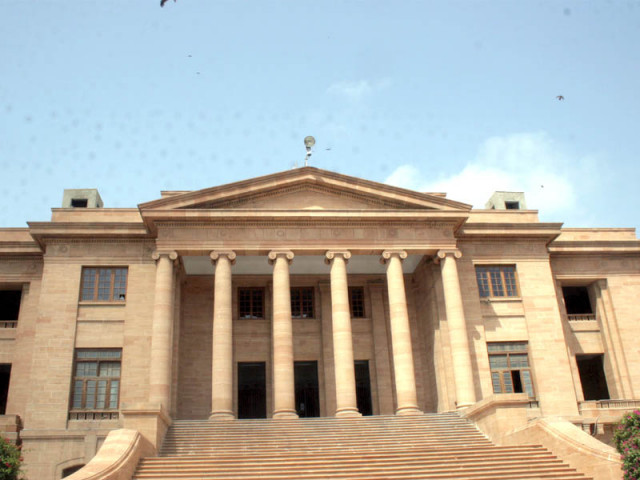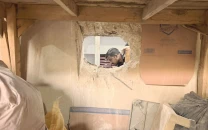Environmental watchdog: Mayor to submit details of encroached land
Commission also wants details of illegal hydrants operating in Karachi

Sindh High Court building.
PHOTO: EXPRESS
Justice Muhammad Iqbal Kalhoro of the Sindh High Court, headed the Supreme Court commission set-up to probe allegations of non-provision of potable water, deteriorating sanitation conditions and its impact on the environment in Sindh, also sought details of illegal water hydrants operating in the city under the umbrella of the Karachi Water and Sewerage Board (KWSB).
On Thursday, Karachi mayor Wasim Akhtar filed a report claiming that there was a serious shortage of potable water in Karachi. He said that since the distribution framework of water was working poorly, water was not reaching the areas at the tail-end.
The mayor said that the construction of the high-rise and buildings had further aggravated problems.
He informed the commission that plans for constructing these buildings were being approved by the authorities without ensuring provision of water and sanitation facilities.
He also pointed out that the illegal water hydrants were still operating in the city, which was one of the main causes of the shortage of water. He said that sewerage system had also gone from bad to worse.
Akhtar claimed that the drains had also been encroached upon but no action was being taken. If any action was taken at all it was only against the poor, he added, citing the example of Habib University, which he claimed was built on encroached land of Nehr-e-Khayam.
He said that departments responsible for municipal services were working independent of each other and proposed that all such departments be given under central command to improve the situation, as then the mayor will be solely responsible.
At this juncture, the petitioner, Shahab Usto, pointed out that certain agreements were executed between the city district government and KWSB during the tenure of former city nazim Mustafa Kamal, as a result of which the land of the treatment plants were leased out illegally. The commission directed Akhtar to submit his reply on the matter. He undertook to submit his statement today.
Advocate Syed Hafeezuddin requested time to file a statement on the point that parallel to the KWSB another system, whereby water was being provided to the industries illegally, was also operating in the city under the umbrella of the KWSB.
To the commission’s query regarding operation of the illegal water hydrants, DIG West and SSP West informed that such illegal water hydrants were running under the umbrella of the KWSB. The DIG said that although the police take action against the miscreants, the KWSB officials were reluctant to come forward to register FIRs against the operators of illegal hydrants.
Contesting his statement, KWSB’s managing-director Misbahuddin Farid said although they report illegal hydrants to the police, the law enforcers do not take action.
Both the police officers gave an undertaking that, henceforth, the police will take action in accordance with the law if any illegal hydrant is found, without waiting for any complaint from the KWSB.
The DIG East also appeared and filed a statement against illegal hydrants, saying that the police in his area were taking action and three FIRs were registered in January.
He said that action was taken against people who illegally take gravel and sand from the Malir riverbed and 11 FIRs has been registered against such persons.
Karachi Chamber of Commerce and Industry’s ex-president Zubair Motiwala said a combined effluent treatment plant was the only answer to all the problems regarding release of industrial effluent into the sea. He said it was not feasible and possible for each industry to have a pre-treatment plant inside its premises. Motiwala said there is a distinction between the factories that produce toxic effluent and others that do not.
Published in The Express Tribune, February 3rd, 2017.



















COMMENTS
Comments are moderated and generally will be posted if they are on-topic and not abusive.
For more information, please see our Comments FAQ